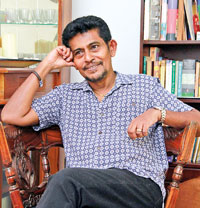Arts
Taking to the stage with his 65th play
When he was 12, he wrote a 20-minute skit for a school show titled ‘Lee (dahaiya) kudu kawa kathawa’. He would go on to act in it, and write many more plays in school and later. Working subsequently at the advertising company J.Walter Thompson (JWC Sri Lanka), he realized that he could make a product launch revolve around a skit. Today, with his 65th play, ‘Love, Lies and Diamonds’ to be staged from September 1-3, Indu Dharmasena has reason to smile.

Indu Dharmasena has much to smile about. Pix by Indika Handuwala
Watching his parents discuss and write the script for the 1969 Sinhala film ‘Kauda Hari’ inspired him to write plays, he says. Just observing Yolande Abeyweera direct plays at St. Bridget’s Convent, he feels he learnt a lot about drama. His early plays drew inspiration in part from many sources such as Georgette Heyer novels and Shakespeare. He would take an idea from a small aspect of the story and adapt it to fit Sri Lankan audiences. For instance, his production ‘Irada Handada’ was loosely based on Shakespeare’s Taming of the Shrew.
Indu’s first original play was ‘Kelema’ – the story of a lady who hearing that her husband was having an affair with his secretary, promptly sent him packing, although the rumour was untrue. As time went on, he began directing many plays, creating his now famous Sri Lankan satire, the 12 ‘Tommiya’ plays and many others, including two Mr. Gajasiri and two ‘Mr. Surasena’ plays based on Agatha Christie’s Poirot novels.
Although his work is well received now, Indu recalls a time when it wasn’t. With plays which blur the lines between Sinhala and English (he admits that he only cannot add Tamil because he does not speak the language) and genuinely Sri Lankan characters who speak and act the way Sri Lankans do in day-to-day life, his ideas are more acceptable now than they were when he started. “In those days the Censor Board would not give you approval for a Sinhala advertisement with a single English word in it or vice versa. I remember when I applied for approval for an advertisement for a razor brand and I said “aiya interview ekata yanna thiyanawa neda’ – they said that I could not use the word ‘interview’. Finally I spent a good hour explaining that no-one would ever say sammuka parikshanaya (the ‘proper’ sinhala word) . As the view that English plays needed to be in the ‘Queen’s English’ faded his brand of theatre gained more acceptance, he says.
There have been other changes too, he says. From a perfectionist director who would ask his cast to perform every action exactly the way he envisioned it, he mellowed after hearing his aunt’s well intended ‘compliment’. “She told me, ‘darling, it was like there were many little Indus on the stage, and thought – well… then there is something seriously wrong’,” he says, flashing his trademark grin. His wife Sanwada remarks that she often finds Indu cutting large chunks out of his old plays when reworking them now. His recently staged ‘At Your Service’ (a 2016 reworked version of a 1997 skit) was completely different from the original. “In fact he tells me that he has no idea why he wrote it like that in the past,” remarks Sanwada.
What hasn’t changed is the fact that his plays are intended to show people the error of their ways by gently pointing out their quirks and flaws and making people laugh at themselves.“With company programmes and all, I did a lot of skits and I found that making people accept their own habits was quite easy. I want people to come to me and say ‘you know, what you said is so true – even I do it’, because then I know that they have understood it for themselves without feeling bad about.”
“His plays are never cruel,” agrees Sanwada.
Interestingly Indu’s plays get written in a few weeks. “Maybe it’s a bad thing because there are almost no stage directions as I direct them myself, but because of that I know exactly how I want the sets, etc and only need to write the dialogue,” he explains. While directing is not too problematic, acting in that same play poses issues from time to time. “I would need to step out of the act from time to time to see what it looks like from the perspective of the audience,” he says, adding that his vast experience comes in handy as he has always written, directed and acted in his plays.
After 64 shows, he feels that he is more nervous before a performance now than ever before. “Maybe it is because I was naïve then and now I am more painfully aware of what can go wrong,” he laughs. He hopes to publish his plays, rework his other old classics and maybe even produce a TV series or a film. Asked if he would like to direct 65 more plays, he simply laughs.

